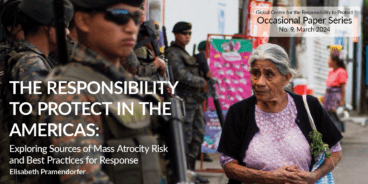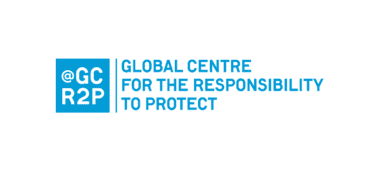Summary of the of the UN Secretary-General’s 2017 Report on R2P: Implementing the Responsibility to Protect: Accountability for Prevention
The ninth report of the United Nations Secretary-General on the Responsibility to Protect (R2P) highlights the importance of strengthening accountability for the implementation of R2P and the prevention of mass atrocity crimes. This is the first report on R2P by the new Secretary-General, Antonio Guterres, and it highlights how R2P fits within his wider prevention agenda. The report asserts that a new approach to international peace and security, including atrocity prevention, is needed. The report outlines practical steps that can be taken by member states, intergovernmental bodies and the UN system to bolster mass atrocity prevention, and explains how to strengthen accountability via legal, moral and political approaches.
Three consultations were organized with member states to provide them with an opportunity to contribute to the report, including two in New York and one in Geneva. Member states and civil society organizations were also invited to provide written submissions ahead of the report’s publication.
KEY POINTS
The Global Centre for the Responsibility to Protect would like to highlight the following key points from the report:
-
- Atrocity crimes impose a devastating toll upon humanity and their prevention is at the heart of the Secretary-General’s agenda. Member states have made numerous political commitments to prevent mass atrocity crimes, and yet the international community spends far more time and resources responding to crises where mass atrocities occur than on preventing them. A new approach is needed which closes the gap between commitment and reality and prioritizes meaningful preventive efforts. To meet this challenge, the international community must strengthen accountability for implementation of the Responsibility to Protect.
- The appointment of a senior government official as an R2P Focal Point is a practical step states can take to improve national accountability for prevention. Fifty-nine states from every region of the world, as well as the European Union, have already done so. The Secretary-General welcomes plans to develop a manual for R2P Focal Points that will assist them in their work and help other states take the decision to appoint their own Focal Point. Through their ongoing efforts, R2P Focal Points can assist one another in the design and implementation of policies and practices that build national resilience to atrocities.
- R2P is based upon obligations under international human rights and humanitarian law, and the duty to prevent atrocity crimes is a clear legal obligation for states. All member states should immediately sign, ratify and implement key international treaties and protocols associated with the prohibition and prevention of genocide, war crimes and crimes against humanity, and provide assistance to victims of these crimes. Member states should also ensure that domestic law criminalizes atrocity crimes as well as their incitement.
- The Responsibility to Protect populations from atrocity crimes is the obligation of the entire UN system. To make mass atrocity prevention a practical program of action there must be greater synergy across the UN. The Secretary-General highlights the importance of effectively incorporating the Human Rights Council, human rights treaty bodies and Special Procedures mandate-holders into a comprehensive atrocity prevention strategy. Among other things, these bodies assist in the identification of potential risks through their monitoring role. Additionally, the Universal Periodic Review (UPR) process can help support atrocity prevention efforts, and could be better utilized to encourage states to develop strategies to address longer-term risks, as well as mobilize international support for national initiatives to address them.
- Efforts to mainstream R2P across the whole UN must continue so that all the tools and capacities available can be utilized to prevent atrocity crimes and protect vulnerable populations. To achieve this, cooperation and coordination between UN entities on mechanisms that address atrocity risks must be strengthened and internal accountability for atrocity prevention improved. The Special Advisers on the Prevention of Genocide and R2P should provide stronger research evidence regarding the structural and operational measures that can be taken within the UN to prevent atrocities.
The full summary of the report is available for download below.
Read Next
Related Content

Expert Voices on Atrocity Prevention Episode 31: Christopher Fomunyoh

